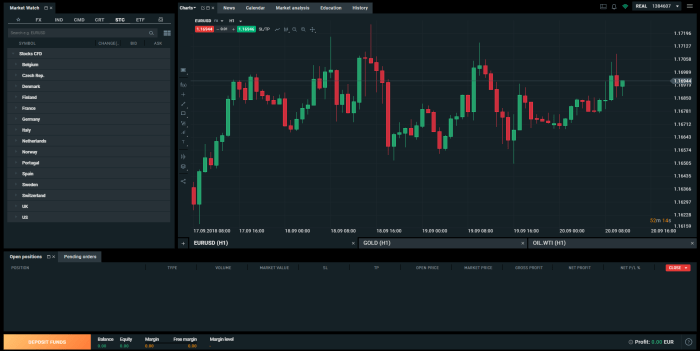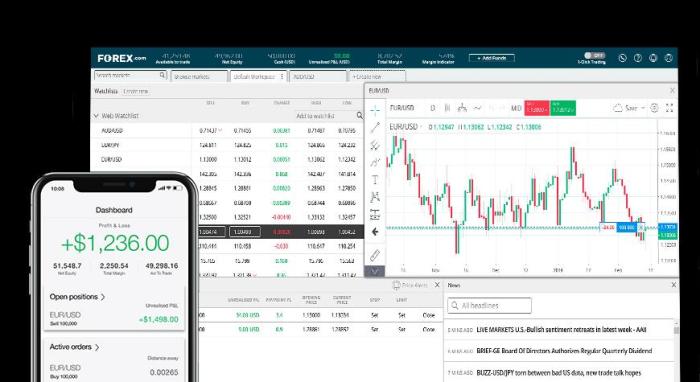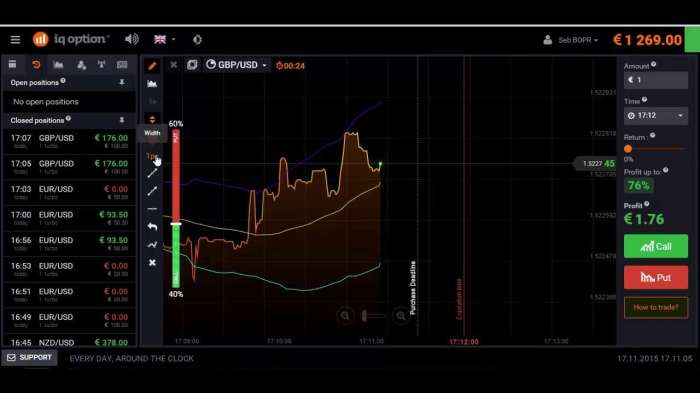
Taxes forex trading – sounds boring, right? Wrong! Navigating the world of forex taxes can be tricky, but understanding the rules is crucial for keeping your profits (and your sanity) intact. This isn’t just about filling out forms; it’s about strategically managing your financial future. From capital gains to deductible expenses, we’ll demystify the complexities of forex taxation, helping you confidently handle your tax obligations.
This guide breaks down everything you need to know about taxes and forex trading, covering everything from record-keeping best practices to tax optimization strategies. We’ll explore how different countries treat forex profits, discuss deductible expenses, and even tackle the impact of fluctuating currency exchange rates on your tax calculations. Get ready to level up your forex game – the financially savvy way.
Tax Implications of Forex Trading Profits: Taxes Forex Trading
Navigating the world of forex trading can be thrilling, but understanding the tax implications is crucial for maximizing your returns and avoiding potential penalties. The tax treatment of forex trading profits varies significantly depending on your location, your trading strategy, and the length of time you hold your positions. Let’s break down the key aspects you need to know.
Tax Treatment of Forex Trading Profits Across Countries
Tax laws regarding forex trading differ substantially from country to country. Some countries may treat forex trading profits as capital gains, while others might classify them as ordinary income, leading to different tax rates and reporting requirements. For instance, in the United States, forex trading profits are generally considered capital gains, taxed at rates dependent on your income bracket and the holding period of the investment. However, in other jurisdictions, such as the UK, the tax implications might be more complex, potentially involving both capital gains tax and income tax, depending on the trader’s status and the frequency of trades. It’s essential to research the specific tax laws of your country of residence to ensure compliance.
Capital Gains Taxes and Forex Trading
Capital gains taxes are levied on the profit realized from the sale of an asset, including currency pairs in forex trading. The tax rate applied often depends on how long you held the asset. For example, in many countries, short-term capital gains (assets held for less than a year) are taxed at a higher rate than long-term capital gains (assets held for a year or longer). Let’s say a trader in the US made a $10,000 profit from a short-term forex trade. Depending on their income bracket, this profit could be taxed at a rate ranging from 15% to 20%. If the same profit was from a long-term trade, the tax rate could be lower, potentially 0%, 15%, or 20%, again depending on the trader’s overall income.
Forex Trading Tax Reporting Requirements
Accurate and timely tax reporting is paramount. The specific requirements vary by country but generally involve detailed record-keeping of all transactions. This includes dates of trades, currency pairs traded, amounts bought and sold, and the resulting profits or losses. Many countries require traders to file tax returns annually, reporting their forex trading activity alongside other income sources. Failure to comply with these reporting requirements can result in significant penalties and legal repercussions. In the US, for example, forex traders are required to report their trading activity on Schedule D (Form 1040), using Form 8949 to detail their capital gains and losses.
Short-Term vs. Long-Term Forex Trading: Tax Implications
The holding period of your forex positions significantly impacts your tax liability. Short-term trading, typically involving frequent trades held for less than a year, often results in higher tax rates due to the classification as short-term capital gains. Long-term trading, characterized by holding positions for longer periods, generally benefits from lower tax rates on long-term capital gains. For example, a trader consistently holding positions for over a year might find themselves in a lower tax bracket for those profits compared to someone engaging in day trading. The optimal strategy depends on individual risk tolerance and tax circumstances.
Tax Rates and Regulations for Forex Trading: A Comparison
| Country | Tax Rate (Example) | Tax Treatment | Reporting Requirements |
|---|---|---|---|
| United States | Variable, depending on income bracket and holding period (0%, 15%, 20%) | Capital Gains | Schedule D (Form 1040), Form 8949 |
| United Kingdom | Variable, depending on income bracket and gains (10%, 20%, 28%) | Capital Gains and potentially Income Tax | Self-Assessment tax return |
| Canada | Variable, depending on province and income bracket (typically 50% of capital gains are taxed) | Capital Gains | T1 General Income Tax and Benefit Return |
Record Keeping and Documentation for Forex Taxes
Navigating the world of forex trading can be exhilarating, but understanding the tax implications is crucial for avoiding future headaches. Meticulous record-keeping isn’t just about complying with tax laws; it’s about protecting your financial well-being and ensuring you accurately claim all legitimate deductions. Think of it as your financial safety net – a well-organized system prevents nasty surprises come tax season.
Proper record-keeping simplifies tax preparation, minimizing stress and potential penalties. A clear, organized system allows you to quickly access all necessary documents, ensuring you accurately report your income and expenses to the tax authorities. This proactive approach not only saves time but also provides a clear picture of your trading performance over time.
A Sample Record-Keeping System for Forex Transactions
Maintaining detailed records of every forex transaction is essential. A spreadsheet program, like Excel or Google Sheets, is a highly effective tool. Your system should include columns for: Date, Transaction Type (Buy/Sell), Currency Pair, Amount Traded (in base currency), Exchange Rate, Brokerage Fees, Profit/Loss (in base currency), and any other relevant notes. Consider adding columns for identifying specific trading strategies employed for each trade. For example, you might note whether a trade was based on fundamental or technical analysis, or part of a specific scalping or swing trading strategy. This level of detail can be invaluable when analyzing your trading performance and justifying your deductions.
Best Practices for Organizing and Storing Forex Trading Records
Organize your records chronologically or by trade type (e.g., all trades for EUR/USD in one section). Regularly back up your records to a secure cloud storage service or external hard drive to prevent data loss. Maintain a physical copy of essential documents as a safeguard against technological failures. A well-organized filing system, either physical or digital, is key. You might consider using folders named by year and then month, for example. Clearly label all files with dates and relevant information, making it easy to locate specific transactions.
Importance of Accurate and Detailed Transaction Records for Tax Purposes
Accurate and detailed records are paramount for several reasons. They provide irrefutable proof of your income and expenses, supporting your tax return and protecting you from potential audits. They also allow you to track your trading performance over time, identify profitable and unprofitable strategies, and make informed decisions to improve your trading approach. Remember, the tax authorities require substantial evidence to support your claims, and incomplete or inaccurate records can lead to penalties and interest charges.
Potential Pitfalls in Record-Keeping That Could Lead to Tax Issues
Common pitfalls include inconsistent record-keeping, missing crucial details (like brokerage fees), and failing to properly categorize income and expenses. Another major issue is failing to keep records for the required length of time, which varies depending on your location and tax laws. Furthermore, neglecting to reconcile your records with your broker’s statements can create discrepancies that trigger an audit. Finally, inaccurate recording of exchange rates can significantly impact your reported profits or losses, leading to tax discrepancies.
Examples of Acceptable Documentation for Supporting Forex Trading Income and Expenses
Acceptable documentation includes broker statements detailing all transactions, including dates, currency pairs, amounts traded, and fees. You should also keep records of any trading software used, supporting the details in your spreadsheet. For expenses, maintain receipts or invoices for any software subscriptions, educational courses related to forex trading, or other legitimate business expenses directly related to your forex trading activities. Remember that documentation should be clear, concise, and easily understandable. Keep all records organized and readily available for review.
Deductible Expenses in Forex Trading
Navigating the world of forex trading isn’t just about making savvy investments; it’s also about understanding the tax implications. While profits are taxable, thankfully, many expenses incurred while building your forex empire can be deducted, potentially lowering your tax burden. Let’s dive into the specifics of what you can claim.
Knowing which expenses are deductible and how to properly document them is crucial for minimizing your tax liability. Proper record-keeping not only simplifies tax preparation but also protects you from potential audits. The IRS requires thorough documentation, so keep detailed records of all your trading-related expenses.
Software and Subscription Costs
Many forex traders rely on sophisticated software and online platforms to analyze market trends, execute trades, and manage their portfolios. These tools are essential for successful trading, and their costs are often deductible. This includes subscriptions to charting software, trading platforms, market data providers, and other specialized tools that directly support your trading activities. For example, a subscription to a premium charting platform like TradingView or a dedicated forex trading platform like MetaTrader 4 or 5 with advanced indicators would qualify. Remember to keep all invoices and receipts as proof of purchase.
Educational Materials and Courses
Continuous learning is paramount in the dynamic forex market. The cost of educational materials, including books, online courses, seminars, and workshops directly related to improving your forex trading skills, are generally deductible. This could range from a beginner’s guide to advanced strategies on technical analysis, fundamental analysis, or risk management. Think of it as an investment in your professional development—an investment that can reduce your tax bill. Keep detailed records of the course fees, materials purchased, and any certifications received.
Home Office Expenses
If you dedicate a specific area of your home exclusively to forex trading, you may be able to deduct a portion of your home-related expenses. This includes a percentage of your mortgage interest, rent, utilities, and home insurance, based on the square footage of your trading space relative to the total square footage of your home. However, the IRS has strict rules regarding home office deductions, so ensure your designated space is used exclusively for business and meets all IRS requirements. Maintain meticulous records of all home-related expenses to support your deduction.
Deductibility Across Trading Strategies
The deductibility of expenses generally remains consistent regardless of your specific trading strategy (scalping, day trading, swing trading, etc.). The key is that the expense must be directly related to your forex trading activities. Whether you’re a scalper making quick trades or a swing trader holding positions for longer periods, the costs of software, education, and a dedicated workspace remain deductible if they support your overall trading efforts.
Substantiating Deductible Expenses
The IRS requires substantial evidence to support any tax deductions. Simply stating that you incurred an expense isn’t enough. You need to maintain detailed records, including:
- Invoices and receipts for all purchases.
- Bank statements showing payments for subscriptions and courses.
- Detailed logs of your trading activities, including dates, times, and amounts traded.
- Documentation supporting your home office deduction, including square footage calculations.
These records should be organized and readily accessible for tax preparation and potential audits. Keeping digital records is acceptable, but ensure they are well-organized and backed up securely.
Common Deductible Expenses
To summarize, here’s a list of common deductible expenses forex traders can claim:
- Software subscriptions (charting, trading platforms, market data)
- Educational materials (books, courses, seminars)
- Home office expenses (portion of mortgage interest, rent, utilities, insurance)
- Travel expenses (for forex-related conferences or educational events)
- Professional fees (consultants, tax advisors specializing in forex trading)
- Computer equipment and maintenance (directly used for trading)
- Internet and communication costs (portion used for trading)
Remember, always consult with a qualified tax professional to ensure you are claiming all eligible deductions and complying with all relevant tax laws. The information provided here is for general guidance only and doesn’t constitute professional tax advice.
Tax Optimization Strategies for Forex Traders
Navigating the complex world of forex trading taxes can feel like navigating a maze. Understanding and implementing effective tax optimization strategies is crucial for maximizing your profits and minimizing your tax burden. This section Artikels several legal and compliant strategies to help you achieve this. Remember, consulting with a qualified tax professional is always recommended for personalized advice.
Legal and Compliant Tax Optimization Strategies
Several strategies can legally reduce your forex trading tax liability. These strategies are not loopholes but rather legitimate ways to leverage the tax code to your advantage. Careful planning and accurate record-keeping are essential for their successful implementation.
Minimizing Tax Liability Through Deductible Expenses
Properly documenting and claiming all eligible expenses is fundamental to minimizing your tax liability. This includes expenses directly related to your forex trading activities, such as software subscriptions, trading platform fees, internet access, home office expenses (if a dedicated space is used), and professional fees for tax preparation or financial advice. Maintaining meticulous records, including receipts and invoices, is paramount for successful expense deduction claims. Accurate record-keeping provides concrete evidence to support your deductions during an audit.
Benefits of Engaging a Tax Professional
A qualified tax professional specializing in forex trading can provide invaluable assistance in navigating the intricacies of tax regulations. They can help you identify all eligible deductions, optimize your tax strategy based on your specific circumstances, and ensure compliance with all applicable laws. Their expertise can save you time, money, and potential penalties associated with tax errors or omissions. They can also provide guidance on choosing the most advantageous account structure for your trading business.
Impact of Different Account Structures on Tax Liabilities
The structure you choose for your forex trading business significantly impacts your tax liability. A sole proprietorship, for instance, simplifies administrative tasks, but your trading profits are taxed as personal income. In contrast, forming a Limited Liability Company (LLC) offers liability protection and may offer tax advantages depending on how the LLC is structured (e.g., single-member LLC taxed as a sole proprietorship or a multi-member LLC taxed as a partnership). Choosing the right structure requires careful consideration of your specific circumstances and future plans.
Comparison of Tax Optimization Strategies
| Strategy | Potential Rewards | Potential Risks | Considerations |
|---|---|---|---|
| Maximizing Deductible Expenses | Significant reduction in taxable income | Risk of audit if documentation is insufficient | Meticulous record-keeping is crucial |
| Strategic Tax Loss Harvesting | Offsetting capital gains with losses | Requires careful planning and timing | Consult a tax professional for optimal implementation |
| Choosing an Optimal Account Structure (e.g., LLC) | Potential liability protection and tax benefits | Increased administrative complexity and potential setup costs | Weigh the benefits against the costs and complexity |
| Engaging a Tax Professional | Reduced tax liability, peace of mind, compliance assurance | Professional fees | Cost-benefit analysis; the potential savings often outweigh the cost |
The Impact of Currency Exchange Rates on Tax Calculations

Navigating the world of forex trading involves more than just predicting market movements; it also requires a solid understanding of how fluctuating exchange rates impact your tax liability. The seemingly simple act of converting profits from one currency to another for reporting purposes introduces a layer of complexity that can significantly affect your bottom line. Understanding these intricacies is crucial for accurate tax reporting and minimizing your tax burden.
The calculation of taxable income from forex trading is directly influenced by the exchange rates prevailing at the time of transactions and at the time of reporting. Because forex trading inherently involves multiple currencies, determining your profit or loss necessitates converting all transactions into your reporting currency (typically your home country’s currency). This conversion process is where exchange rate fluctuations play a critical role. The rate used for conversion directly impacts the reported value of your trades, and consequently, your taxable income.
Currency Conversion for Forex Trading Income Reporting
Reporting forex trading income requires meticulous record-keeping and accurate currency conversions. Each transaction, including buys and sells, must be converted to your reporting currency using the exchange rate applicable on the transaction date. This rate is typically sourced from reliable financial data providers or your brokerage platform’s records. Simply using the current exchange rate at the end of the tax year could lead to significant inaccuracies and potential tax discrepancies. Maintaining detailed transaction records, including the date, currency pair, exchange rate used, and the amount in each currency, is essential for accurate reporting.
Examples of Exchange Rate Fluctuations Impacting Tax Liability
Let’s illustrate with an example. Suppose a trader bought 10,000 EUR at an exchange rate of 1 EUR = 1.10 USD, investing $11,000. Later, they sold the EUR at 1 EUR = 1.15 USD, realizing a gross profit of $500 (10,000 EUR * 1.15 USD/EUR – 10,000 EUR * 1.10 USD/EUR). If the exchange rate had remained at 1.10 USD/EUR, the profit would have been zero. Conversely, a decrease in the exchange rate would have resulted in a loss. This simple example highlights how even small fluctuations can substantially alter your reported profit and subsequent tax liability. Another scenario: a trader holds a position in a foreign currency over an extended period. If that currency depreciates against the reporting currency during that time, the realized profit upon sale will be lower, and therefore, the tax liability will be lower as well.
Determining the Appropriate Exchange Rate for Tax Purposes
The method for determining the appropriate exchange rate depends on the specific tax regulations of your jurisdiction. Generally, the exchange rate on the date of the transaction is used. However, some jurisdictions may allow the use of an average exchange rate over a specific period or may have specific rules for different types of transactions. It is crucial to consult with a tax professional familiar with forex trading regulations in your country to ensure compliance. Using incorrect exchange rates can lead to penalties and interest charges. Reliable sources for obtaining exchange rates include major financial news websites, your brokerage statements, and dedicated currency exchange rate data providers. Documentation of the source and method used for determining the exchange rate is crucial for audits.
Implications of Currency Exchange Rates on Capital Gains and Losses
Exchange rate fluctuations directly impact the calculation of capital gains and losses in forex trading. A change in the exchange rate between the purchase and sale of a currency pair affects the final profit or loss expressed in the reporting currency. For instance, if a currency appreciates against the reporting currency between the purchase and sale, the capital gain will be higher than if the exchange rate had remained constant. Conversely, depreciation will result in a lower capital gain or even a capital loss. Accurate calculation of capital gains and losses, considering exchange rate movements, is crucial for determining your overall tax liability. Understanding the tax implications of these fluctuations is essential for effective tax planning.
Tax Implications of Forex Trading Losses
Navigating the world of forex trading involves understanding not only the potential for profit but also the reality of potential losses. Knowing how tax laws treat these losses is crucial for minimizing your tax burden and making informed trading decisions. This section will clarify the tax treatment of forex trading losses, outlining how they can be used to offset gains and the limitations you should be aware of.
Forex trading losses, like other investment losses, aren’t simply written off. Instead, they can potentially reduce your overall tax liability, but the rules surrounding their application are quite specific. The key factor is understanding the difference between short-term and long-term capital losses and how they interact with your other income.
Deduction of Forex Trading Losses Against Other Income
Forex trading losses can be used to offset capital gains from other investments. This means if you made a profit selling stocks but incurred losses in forex trading, you can reduce the taxable amount of your stock profits by the amount of your forex losses (up to certain limits). It’s important to note that these losses generally cannot be used to directly reduce your ordinary income (like salary or wages). The Internal Revenue Service (IRS) in the United States, for example, specifically addresses this; forex trading is considered a capital asset, meaning gains and losses are treated as capital gains and losses, not ordinary income. This is true for most jurisdictions, though specific rules vary by country. Consult a tax professional for advice tailored to your specific location.
Limitations and Restrictions on Deducting Forex Trading Losses
There are limitations on how much loss you can deduct in a single tax year. In many jurisdictions, the amount of capital losses you can deduct against ordinary income is capped. Any losses exceeding this limit can be carried forward to future tax years to offset future capital gains. For example, in the US, you can deduct up to $3,000 of capital losses against ordinary income annually. Excess losses are carried forward indefinitely. This means that even if you have significant forex losses in one year, you may not be able to deduct the entire amount immediately. The specific rules and limitations vary by country and should be checked with a qualified tax advisor.
Tax Treatment of Short-Term Versus Long-Term Losses
The holding period of your forex positions dictates whether your losses are considered short-term or long-term. Short-term losses result from positions held for one year or less, while long-term losses arise from positions held for more than one year. The tax implications differ slightly; short-term losses are typically offset against short-term gains, while long-term losses are offset against long-term gains. If you have both short-term and long-term losses and gains, the IRS (or the equivalent in your jurisdiction) typically allows for netting of these losses and gains within their respective categories before any netting between short-term and long-term occurs. Understanding these distinctions is vital for accurate tax reporting.
Examples of Situations Where Forex Trading Losses Can Offset Gains, Taxes forex trading
Imagine a trader who made $10,000 in profit from stock investments and incurred $5,000 in losses from forex trading. In this scenario, assuming no other capital gains or losses, the trader would only pay taxes on $5,000 ($10,000 – $5,000) in capital gains. Another example: a trader with $2,000 in short-term capital gains from options trading and $4,000 in short-term capital losses from forex trading would have a net short-term capital loss of $2,000. This loss could then be used to offset future short-term capital gains, up to the annual limit for capital loss deductions against ordinary income. These examples illustrate how strategically utilizing forex trading losses can significantly reduce your overall tax liability. Always consult a qualified tax professional for personalized advice.
Wrap-Up
Mastering the art of forex trading isn’t just about mastering the markets; it’s about mastering the tax implications too. By understanding the nuances of forex taxation, you can not only stay compliant but also optimize your financial strategy. Remember, proper record-keeping is your best friend, and seeking professional advice when needed is a smart move. So, go forth, trade confidently, and conquer those tax returns!
Expand your understanding about forex signal trading with the sources we offer.
Get the entire information you require about forex trading newsletter on this page.




